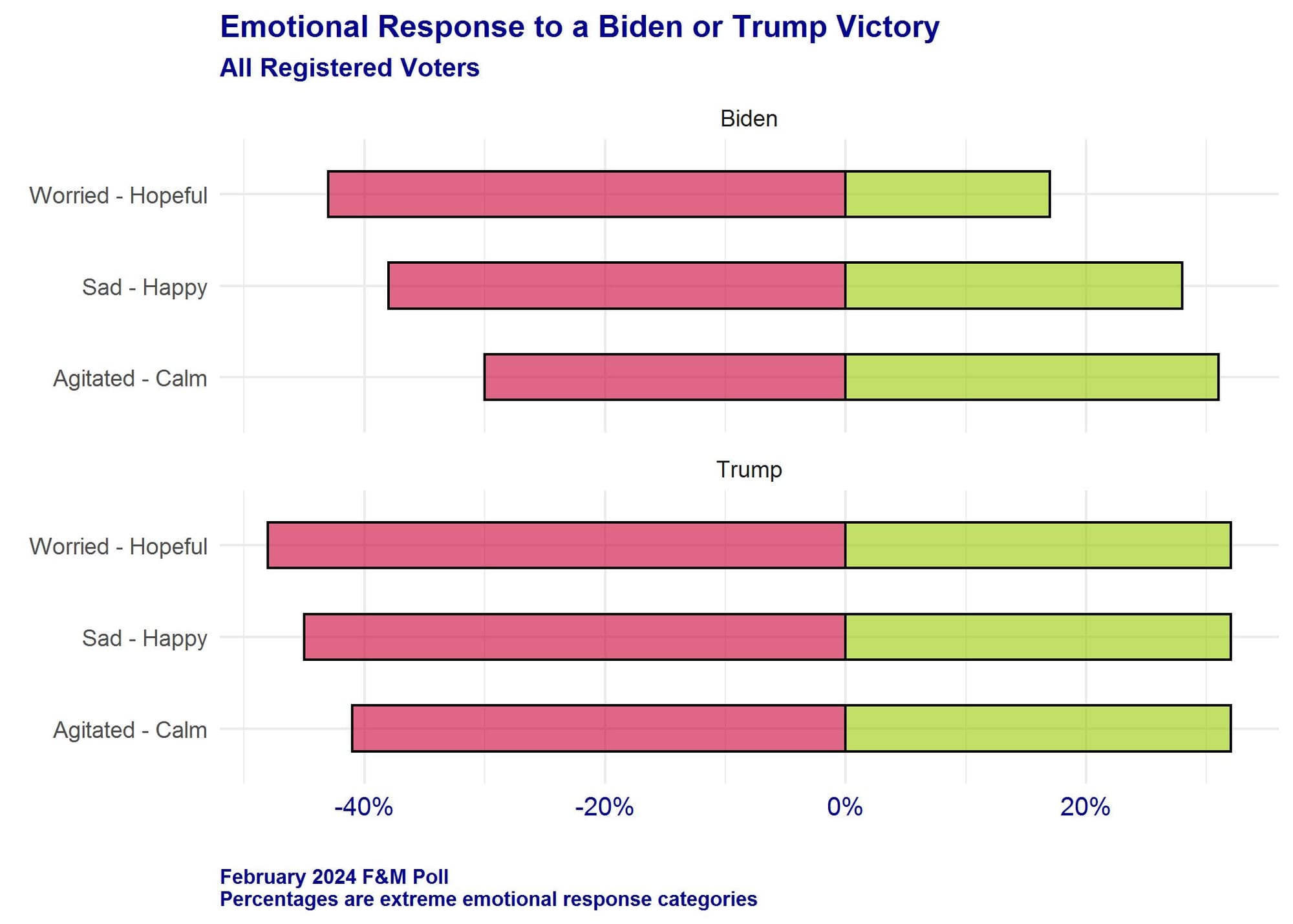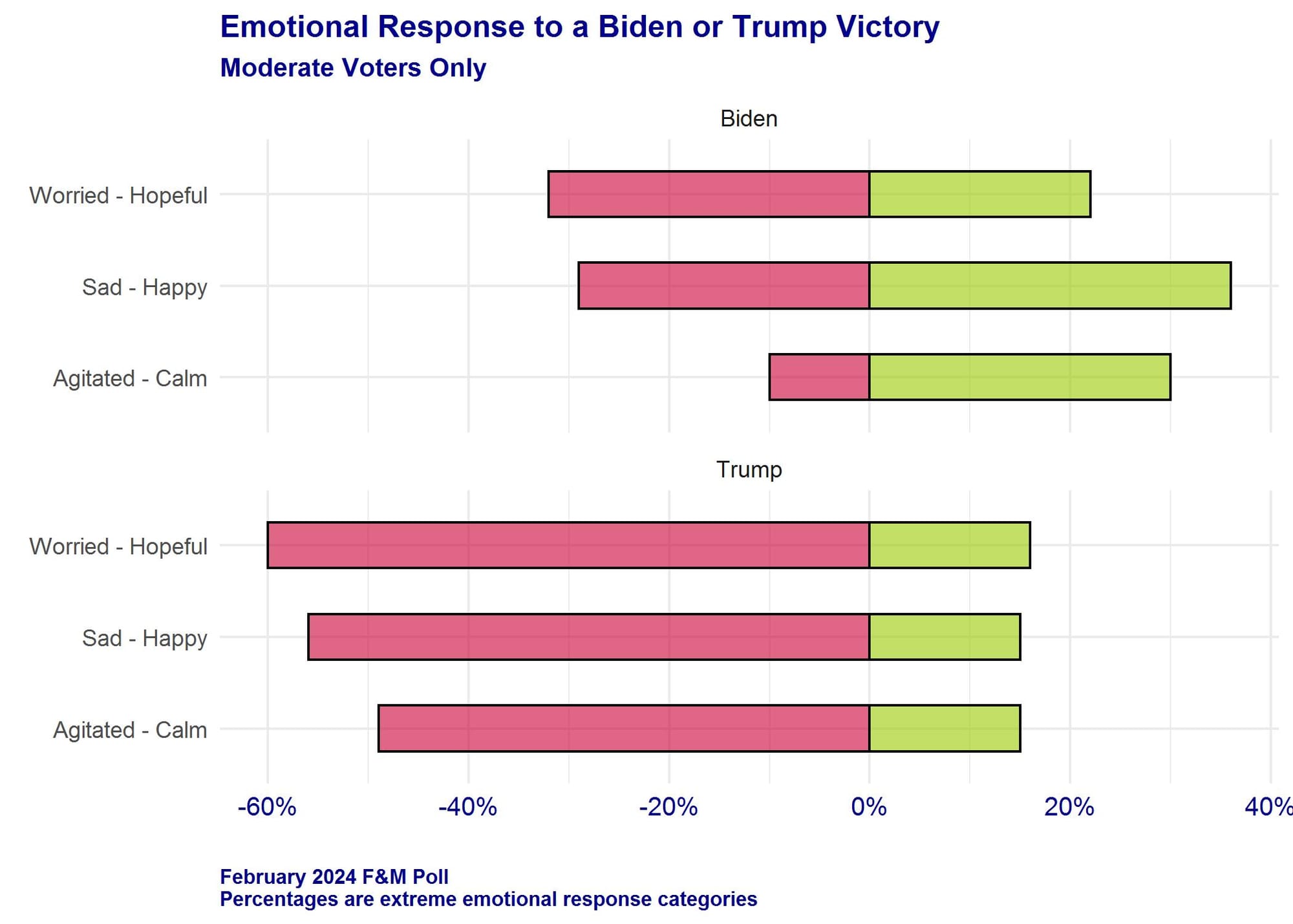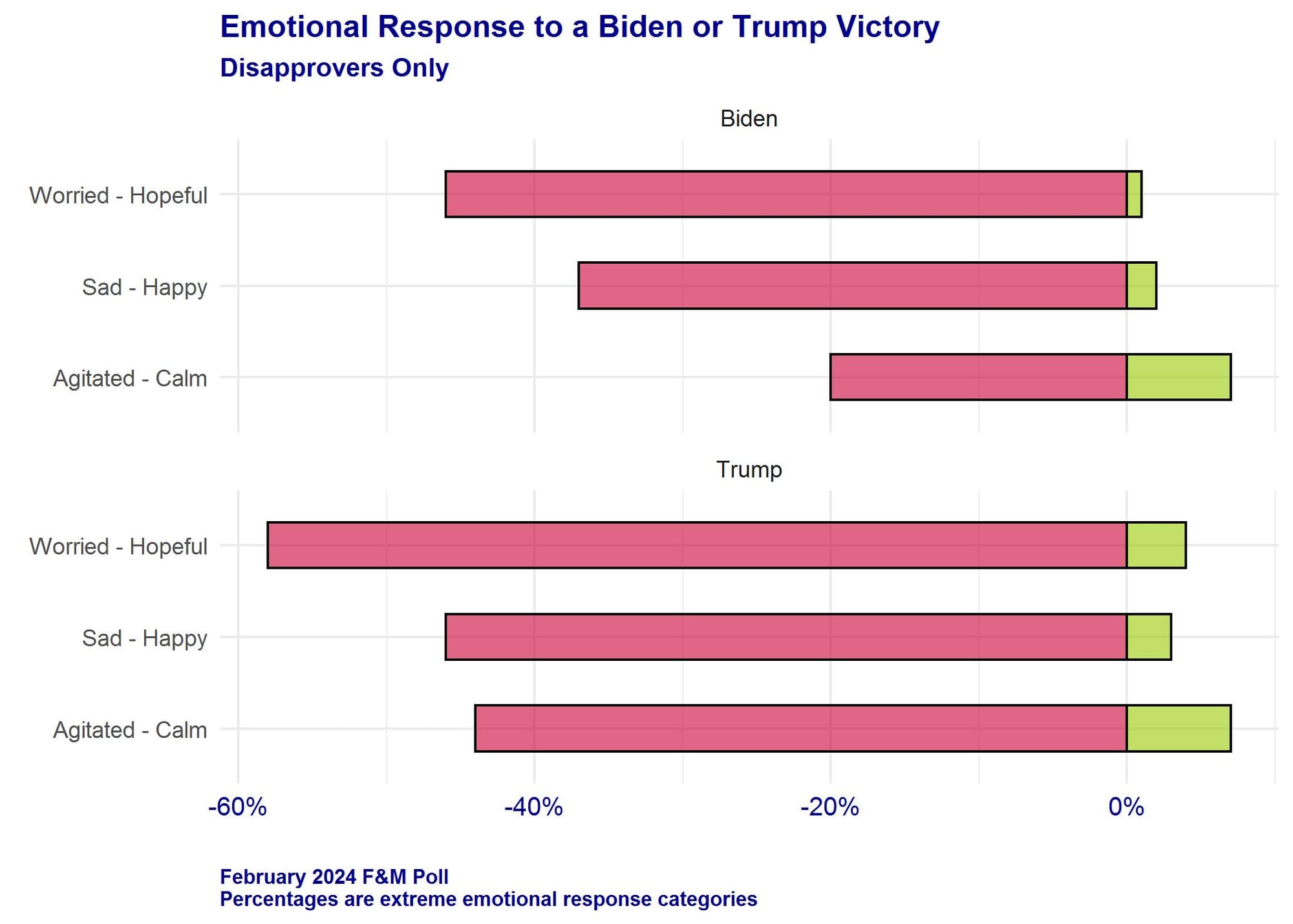Voters' Emotions and the 2024 Presidential Election
How will emotions--both positive and negative--about Biden and Trump affect the 2024 presidential election?
Dear Readers,
Today we revisit some of the data we gathered in our February poll that asked voters how they would feel about a Biden or Trump victory in November. Tracking these emotional responses--called affective forecasts--shows some good and bad news for each candidate, and also offers a different way of thinking about the electoral advantages that each candidate currently has.
Thank you for reading,
Berwood Yost
Public opinion researchers who study voting behavior ask questions that conform to commonly held beliefs about the various paths that voters follow when choosing a candidate. For a good many voters, their path is straight and clear because nationalization and affective polarization make the opposing party's candidate unacceptable. These partisans will vote and it will be for their party's standard-bearer, warts and all.
A second path might follow the issues. Many of those who write and think about politics see this as a common pathway. The issue pathway reflects a voter's view about which candidate is closest to their own beliefs about an issue or set of issues that is important to them. This is the rational pathway that leads voters to the candidate who best represents their own perspectives, which can be an easy pathway for single issue voters, particularly when each party's position is undoubtedly different. Abortion rights come to mind.
The issue pathway is a bit more difficult to follow for issues where there are numerous policy options, solutions, regulatory bodies, and interest groups involved. There are many complicated issues where voters lack sufficient information, or time and energy, to map out their own positions in relation to the positions of multiple candidates. In fact, they may not accurately understand government policy on a given issue in the first place. The economy comes to mind. Which policies produce healthy economic outcomes? Still, voters may have a high-level sense of who is better able to handle a salient issue, absent policy details.
Complicated issues like these might also encourage voters to consider their self-identity and the social groups to which they belong. This might lead a voter to align their feelings about a candidate with their own self-identity, making choices that reflect how they view themselves and the groups to which they identify, political or otherwise.
Our polls, like most, gather information about the waypoints that mark these pathways by capturing data about partisanship, ideology, issue priorities, comparative candidate assessments, demographic attributes, and related indicators. But we don't often ask voters how they would feel if a particular candidate won.[1]
Psychologists believe that our emotional predictions about the outcomes of future events, something they call affective forecasts, are commonly used in everyday life and play a role in many of the decisions we make.[2] Some psychologists suggest that affective forecasts help people chart their life courses[3] and studies show that anticipated emotions are powerful predictors of the decisions people make.[4] This line of research emphasizes that our anticipated emotions about future events are likely to drive many of our decisions, including who to vote for on election day.
Tracking the emotional responses of voters to the presidential candidates could be important this year, for at least two reasons. First, former President Donald Trump evokes strong emotional responses among his supporters and detractors alike. One scholar who studied the 2016 campaign contrasted the emotions that connected Trump's voters with his candidacy to the lack of emotional content in the Clinton campaign as a defining factor in his surprise victory. In our final survey of the 2020 campaign we found that most (78%) of those planning to vote for Donald Trump were voting for him, not against Joe Biden, but that most (54%) of Biden's supporters were voting against Trump.
Second, there is a sizable number of voters who feel unfavorably about both candidates. While partisanship, ideology, or specific issues may move these voters, getting a sense of their emotional reactions to these candidates might help us understand which way they could go.
Emotions and the 2024 Election
We included questions about these affective forecasts in our February 2024 Franklin & Marshall College Poll to add to the traditional indicators we use to understand how voters are thinking and feeling. To do this, we asked survey participants a series of three questions about how they would feel if Donald Trump or Joe Biden were elected in November, with participants randomly asked about their emotional responses to either a Trump or a Biden victory. The figures below show the percentage of respondents answering in the most extreme categories, for example, either "very happy" or "very sad." The bars representing the extreme negative emotions are red and the proportion answering is shown as a negative value to reinforce their negative content. The bars representing the extreme positive emotion are green.
Mr. Trump generates pretty consistent positive emotions, with about a third of voters expressing "very" positive feelings about his winning and exceeding President Biden on the positive emotional responses he generates among all voters (see Figure 1). But Mr. Trump also outpaces President Biden in the negative emotional responses he generates. Responses to a Trump victory are more likely to be in the extreme categories than is a win by President Biden.

Emotions and Ideology
Viewing these emotional responses in aggregate is interesting, but is also confounded by the views of the most partisan and ideological voters. Voters with strong partisan identities tend to experience more extreme emotional responses to political events, which is also true for those with strong ideological ties, meaning strong liberals and conservatives. These tendencies are supported by this data: liberals and conservatives asked these questions uniformly expressed negative feelings about the candidate on the other side.
As we might expect, the emotional forecasts of moderate voters are much different than the forecasts of more strongly ideological voters. Among moderates, President Biden evokes a much larger share of positive forecasts and a much smaller share of negative forecasts than does Mr. Trump (Figure 2). A plurality of the state's voters tend to think of themselves as moderate, and these voters will have a lot to say about who carries Pennsylvania this year. This seems to be good news for the incumbent.

Former President Trump, though, can claim something positive when looking at the emotional responses of the more ideological voters. Consistently, about seven in ten conservative voters say they would be very happy, very hopeful, and very calm if Mr. Trump won in November. Positive emotions are much less apparent among liberals should Mr. Biden win in November--just over half (58%) say they would feel very calm, fewer than half (45%) say they would be very happy, and only one in four (26%) say they would be very hopeful about a Biden victory. This emphasizes Mr. Biden's weakness with his base and Mr. Trump's strength with his.
Emotions and the Disapprovers
Our recent polling has found that a large group of voters, roughly one in five, have negative, unfavorable opinions about both President Biden and Mr. Trump. These current assessments resemble the 2016 election when a large share of voters (16%) had an unfavorable opinion of both candidates on Election Day. The exit polls showed that the "disapprovers" broke for Mr. Trump 56% to 31% over Hillary Clinton. These "disapprovers" will undoubtedly be vital to the 2024 outcome.
Unsurprisingly, disapprovers have significantly more negative than positive emotional responses to an electoral victory by either candidate (Figure 3). This may explain why a large share of voters who said in our last poll they were undecided or planning to vote for a third-party candidate disapproved of the two major party frontrunners. Despite the general negative emotional responses that disapprovers have for each candidate, those negative emotional responses would be much stronger should Trump win than should Biden win.

Conclusions
Voters' feelings about a Biden or Trump victory show how much emotion is driven by former President Trump's candidacy among both his supporters and his opponents. President Biden's candidacy carries much less emotional content. While this finding is more confirmatory than revelatory, it is important.
It is equally important to understand how significant a problem the lack of excitement within the President's base is for him. In particular, the small portion of liberals who would feel very hopeful or very happy about his victory is a tremendous challenge. This challenge probably requires his campaign to do more than simply tout his policy successes and proposals. He needs to find a way to emotionally connect with his base. Whether concerns about his age would be altered by such a connection is unclear, but it might be worth asking whether the lack of a positive vision about the future could be magnifying concerns about his age.
Notes
[1] We have included affective forecasts in past surveys. See, for example, Troy, A., Ciuk, D., Johnston, B., Yost, B. (2018). Did Voters Accurately Predict Their Emotional Responses to Trump? Affective Forecasts of the 2016 US Presidential Election. Paper presented at the 2018 Society for Personality and Social Psychology Convention, March, 2018, Atlanta, GA.
[2] Lowenstein, G. (2007). Affect regulation and affective forecasting. In J. J. Gross (Ed.), Handbook of Emotion Regulation (pp. 180-203). New York: Guilford Press.
[3] Gilbert, D. T., Pinel, E. C., Wilson, T. D., Blumberg, S. J., & Wheatley, T. P. (1998). Immune neglect: A source of durability bias in affective forecasting. Journal of Personality and Social Psychology, 75 , 617-638.
[4] Baron, J. (1992). The effect of normative beliefs on anticipated emotions. Journal of Personality and Social Psychology, 63, 320-330.
Franklin & Marshall College Poll Newsletter
Join the newsletter to receive the latest updates in your inbox.
